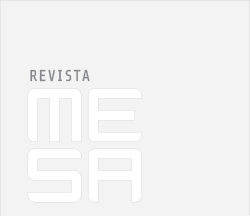
“Keep the Children in the Room:” On the Biopolitics of Single Mothering in the Time of Covid
Dialogue between Livia Moura and Chrystalleni Loizidou
This dialogue is part of a project entitled “On the Knowledge We Receive Through Our Vagina” an initiative of the Ixodos collective.1
Email 1: Infantophobia and Aphrodite
Chrystalleni Loizidou, 26 April, 5th Lunar cycle of 2020
He’s asleep! This means I have a few minutes to write to you. I send you love, wild love, and for your birthday I send you the smell of the sea with a splash of salty mediterranean sea foam. And I give myself the task of articulating how our conversations and shared instincts remain at the core of my experience, even after almost a year, and especially during the covid-19 isolation.
I write this with the intention of ritually naming something in order to dispel it, in order to become free of it, because I’ve been angry and saddened by this isolation and its absurdities that run so counter to the revelations I had during my time with you. I feel you are one of the very few people who will understand this both in a lived and theoretical sense. Our biopolitics of these conditions, I believe, are aligned, and if we didn’t already have too many titles for our work together – The Knowledge We Receive Through Our Vagina; Writing With the Ballpoint of the Clitoris; Why Infantophobia is Important to Maintain the System ? – I would suggest we add something like “on the biopolitics of maternity and single motherhood during covid-19.”
You come to my mind as you stood meditating next to the Aphrodite stone, having been forbidden to touch it by the guard at the Kouklia Aphrodite Temple, two years ago. I’m thinking of my sense of urgency, at that time, that we had to find a way for you to touch it, because it was important, normal, even expected of visitors to touch the stone until recently. But this time the guard’s attitude suggested that soon it would become harder for people to perform this basic and simple communion. That the stone might soon be surrounded by cameras or put in a glass display case, further museified, removed from function, “protected”, its ceremonial power and connecting potential neutralized, removed from flow.
I reach out to you, in your wisdom of that meditative state, to process something: It was a revelation for me, the connection between (a) the ban on touching (and later the ban on dancing), and (b) the Covid-19 madness and the mass direction towards securitization and sanitization against ritual, against spontaneous and viscerally creative response to place: the marginalization of our playful instincts, our exuberance, our magic. A social anthropologist friend made a connection between what I told him about our work together, and Mary Douglas’ definition of “matter out of place.”2 We were at a coffee shop and he illustrated his point by taking a little soil from a nearby potted plant and throwing it onto the table. It was disturbing, and I think this disturbance is what you were talking about: you talked about children during an academic lecture or a political discussion, about our anxious attempts to stop them from naturally touching things in a museum, from eating sand, sneezing everywhere, hugging everyone, offering a bite of their half-eaten apple to a new friend.
Here is the question I’d like your help with: Is it just my experience, or is the Covid-19 dictum for “social distancing” (between everyone, rather than those who choose it or need it) an instance of infantophobia? A paradoxical directive that marginalizes and oppresses children and all those who are unable to follow it? Aren’t these measures that prioritize fear of death over community support, and entirely dismiss spirituality, that distance us from each other, from our nature, and from nature itself, psycho-suppresive products of an infantophobic system?
At Kouklia, next to the stone, I admired your casual transcendence of what for me was the terrible and ruinous influence of surveillance capitalism. I watched you vibrate next to the stone and saw your power render irrelevant a whole set of frightening political conditions.
I wish a fiery torch for your birthday, full of ecstatically burning inspiration and liberating-contaminating flows.
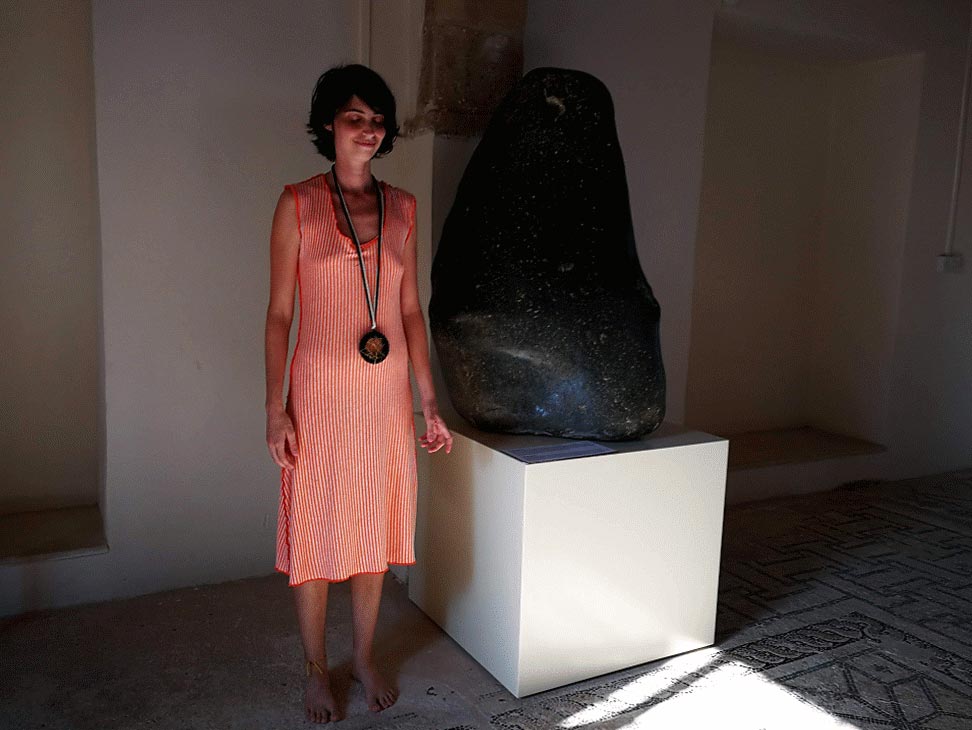
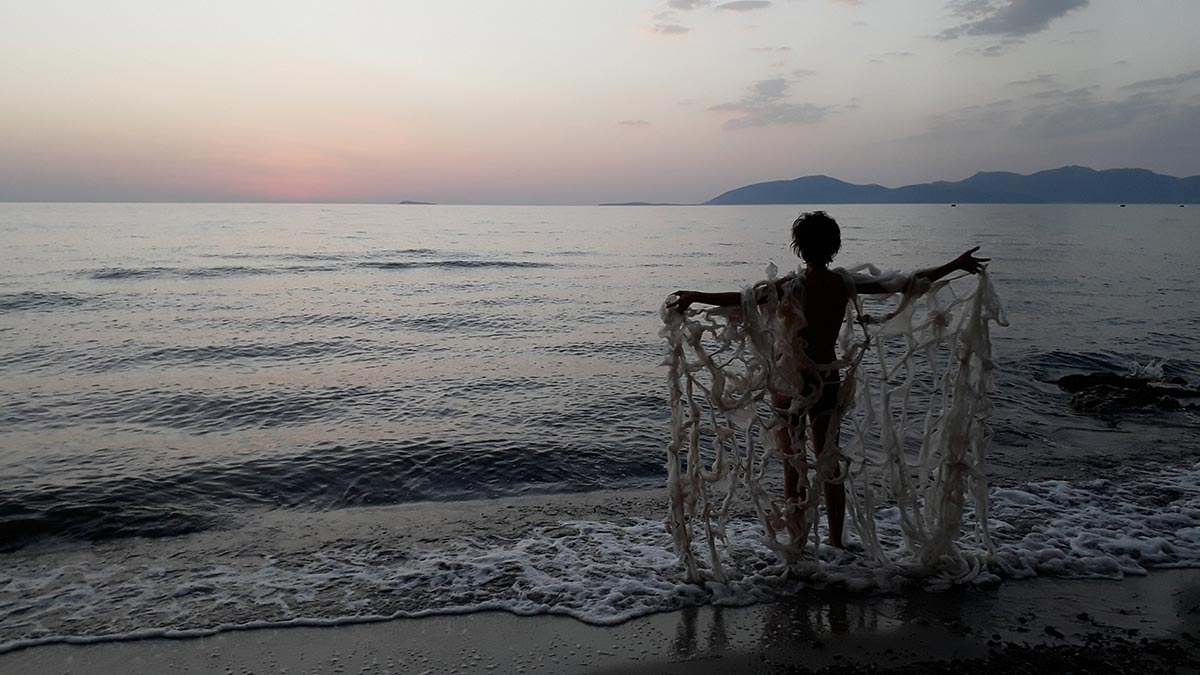
Email 2: Childhood and Maternagem [Mothering] will Guide Us
Livia Moura, May 1st, 5th Lunar cylce of 2020
Chrys, yes! We need a lot of liberation of contaminating streams! Thanks!!!
I imagine that the pandemic in Cyprus is somehow calmer? Here in Rio [de Janeiro] for a variety of social, political, and health reasons, things are unfolding in a very tragic way… isolation and hygiene are very necessary, at least as an emergency measure.
I love you and Janus so much! I miss you. Forgive me for the delay in responding. Sometimes I feel frustrated at being exhausted and not having time for my projects. Physically it has not been easy, I am submerged in housework, taking care of children 24 hours alone and at the same time my mind is teeming with so many deep and powerful reflections on all of this.
The future has arrived! The time has come to make what we thought and rehearsed together about the future happen. We all have an artist inside us who needs to occupy other spaces, in addition to museums, books, and the stage! I feel a strong drive to redraw the real landscape, be more consistent with what I believe and put it into practice. I am currently setting up a website to literally sell virtuous shares in an ethical stock exchange. This was VAV’s initial project [VAV is the acronym of Vendo Ações Virtuosas [Selling Virtuous Actions], a contemporary art platform co-created by Lívia Moura in 2013 (website: www.vendoacoesvirtuosas.art). VAV acts in the intersections between pedagogy, economics and social engagement using art as a tool of synthesis. VAV’s main actions include: urban interventions, pedagogical projects, exhibitions, publications and currently a complementary virtual economic platform, Banco do Afeto: www.bancodoafeto.art.]. It is only now, 7 years later that it is really coming into fruition. The pandemic crisis makes it urgent to embody these ideas and take them out of the realm of metaphor.
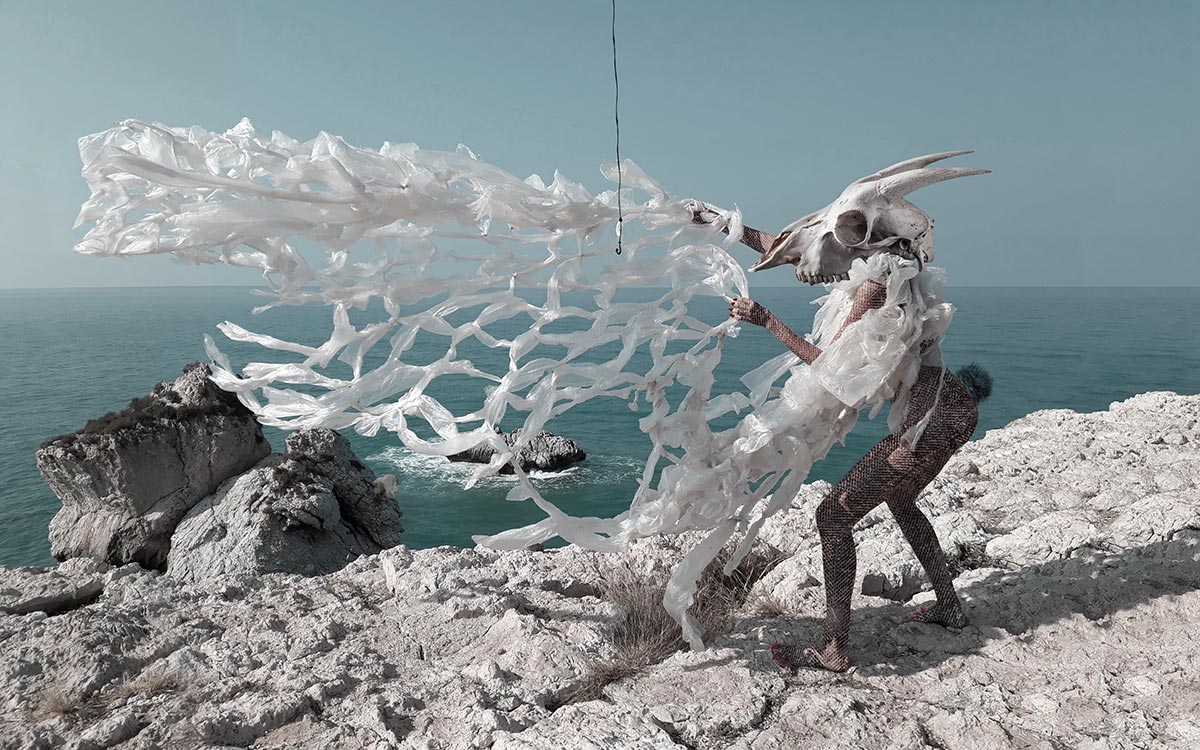
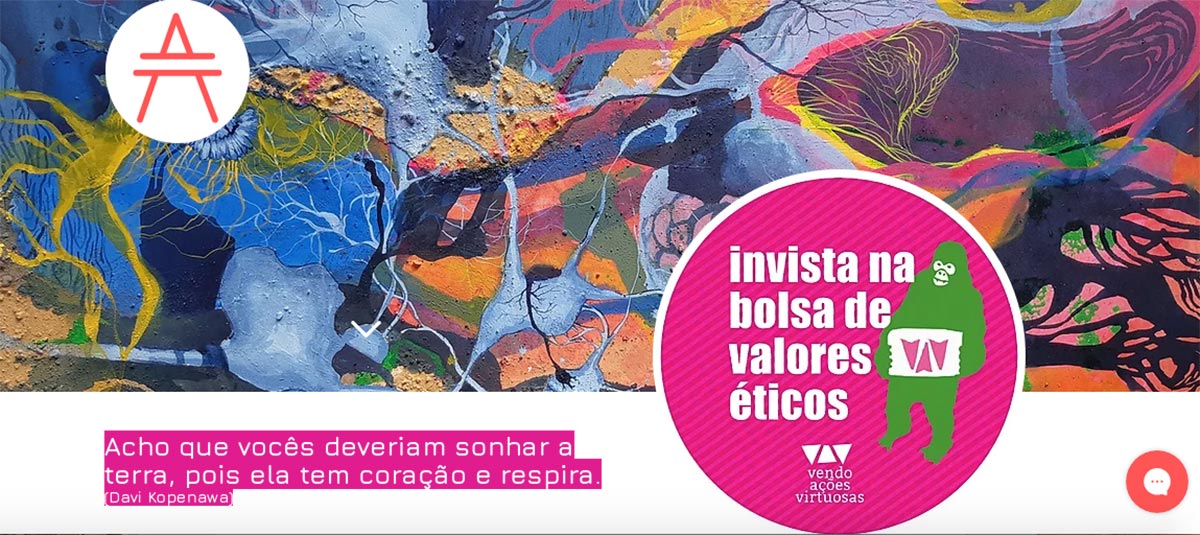
I wonder what is it that connects us so deeply since we met at the exhibition Guanabara Bay: Hidden Lives and Waters at MAC [Museu de arte contemporânea de Niterói] in 2016. I feel that it has absolutely everything to do with what has caused this Covid-19 crisis.
What unites us is this desire to drink from the ancestral source: the search to rescue stories, knowledge, rituals, and ways of life that have been hidden by the predatory dynamics of dominant and oppressive societies. This desire to rescue the ancestry within us: a common root that will free our branches, leaves, and fruit (not by chance, forbidden fruit). Drink from the source of ancestral wisdom present in the peoples of Latin America, in cultures of African and Asian origin, but also in ancient Europe and the Middle East; especially from that pre-patriarchal wisdom that has left such deep marks on the earth. I was fascinated during our pilgrimage residence to Greece, how this wisdom survives in the popular imagination of wise women.3 But I also believe that we need to access the mineral, vegetal, water wisdom. And to think with the stars.
Drinking from these sources activates the truth that lives in the cells of our own body. It can set us free to access our own truth, the source of immemorial wisdom that lives in each one of us.
As much as archaeological sites are literally in ruins and hyper-controlled by museum surveillance, Gaia and Aphrodite are more powerful than they are.
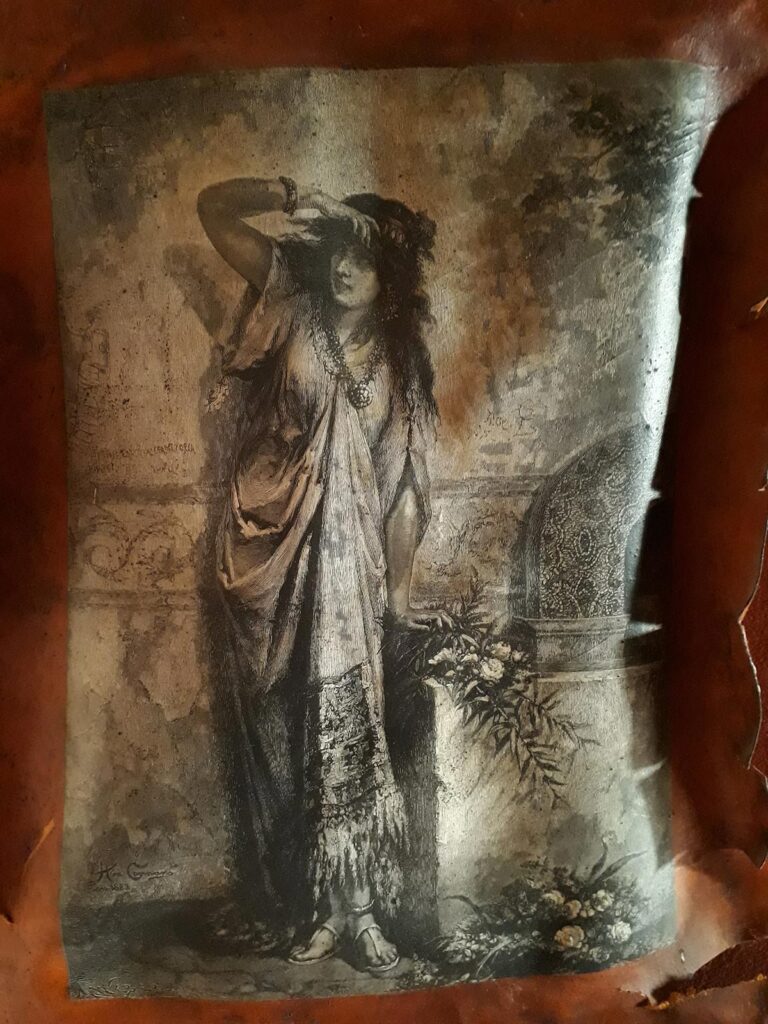
These stories that we heard (and traversed) in powerful encounters across Greece and Cyprus in 2018 remain alive in my pores. I can still access the sensation of my body opening up in the ancient temples where the pre-patriarchal goddesses guided rituals of premonition, sacred sexuality, and communion.
I confess that the reports about “sacred prostitutes” shocked me a lot. It is a total paradigm break to know that they had the function of opening the minds of philosophers through studies, the arts, and sexuality. On top of that, they occupied one of the highest places in the religious and social hierarchy, and could even get married, as long as they continued to exercise their function.4 As Carol Cortes said: “joining the useful with the formidable!” hahaha. Two years later, I am still reaping the rewards and it will take me a long time to put into practice all these experiences of mental and spiritual openness.

You ask me if the isolation measures are not an expression of this infantophobic society. I think that in reality this crisis is the consequence of an infantophobic society. When I talked to you about “infantophobia” it was more in the sense of biopolitics than necropolitics. The fact that we no longer live in community (something relatively recent in the history of mankind) means that many people have never lived together with children. And this generates irrational fear and aversion with the presence and lack of control that a child generates, especially because the design of houses and all environments in a contemporary westernized city favor keeping children out of view. Another thing that creates an irrational “aversion” to children is the fact that the adult has not been able to live his own childhood in the broad sense. Having your inner child repressed, it is common not to tolerate the presence of children who express themselves fully as children: making a mess, shouting or crying. This structure of the bourgeois family, father, mother and children in a house, separates children from daily life with other relatives (not counting single mothers). In the past, everyone lived with a small nephew or cousin and, somehow, knew how to live with children. But the word infantophobia has not been used, including by us, only in this sense. But in a broader sense, where motherhood becomes a social obstacle that hinders the hyper-productivity of the capitalist system because it is convenient for the system to keep us submissive and in a precarious situation. It is convenient to make us believe that we are useless and underproductive when we are actually offering free work that is crucial to maintaining the system: creating future workers for the system.
Isolation exacerbates all of this, but it can also be used as a key to inflection.
I believe that the sense of childhood and motherhood will guide us out of this crisis. The solutions will come from the people at the base of the pyramid, from those who are living under pressure, from us mothers and from all the people who practice motherhood in relation to the planet. The sense of childhood with its creativity, breaking standards, and the naturalness of mixing with sand, stones, plants, and animals (through all the holes in the body) are the key to rediscovering our road toward humanity.
Infantophobia is necessary for the maintenance of capitalism. In a convivial world – like the indigenous people here in Brazil and the old matrifocal societies in Cyprus – children and the elderly are not a problem, they are our source of wisdom, sustenance, and joy. We single mothers are experiencing extremely difficult personal moments due to isolation. Most of the activities did not close, but the schools closed, after all we mothers do not do more than our obligation to be locked up with the children at home for 24 hours. But as the artist and mother Mariana Pimentel says – who calls herself a “domestic-theoretician” – this is not our personal problem; it is a political problem that capitalism imposes on our bodies.5
Now I am spending a short period of quarantine at A Casa Lar, in Alto da Boa Vista [Rio de Janeiro] this space of residence and community organized by Carol Cortes, where you were for a few months last year with Janus. This place that has hosted many VAV meetings, rituals with indigenous sacred medicine, holistic healing, and so many artists outside the box!
My children are running free in the woods while I try to finish this email. I spent 2 months confined with them and my mother inside an apartment: maddening. I know that single mothers are in a more fragile situation, but the bourgeois family itself (father, mother and children) is also a structure that does not favor anyone. Children need to be raised by a community and not by 2 people who deposit them at school to spend the day working outside the home and returning exhausted to continue to work at home.
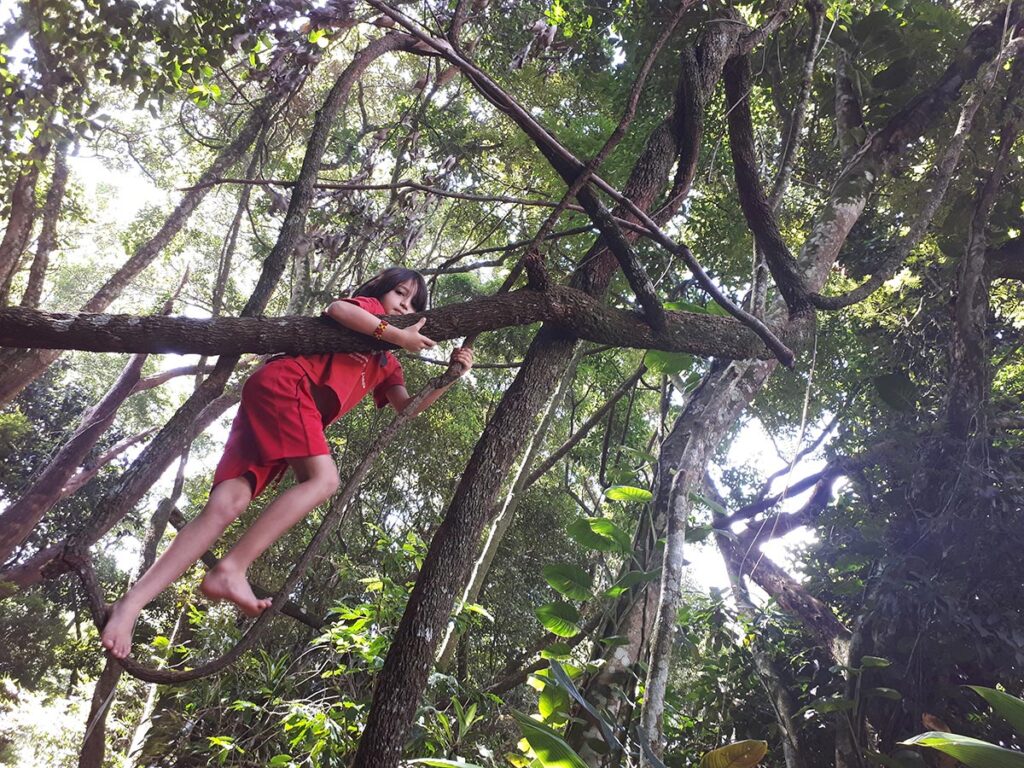
Kito (my youngest son) now hides under the table in the expectation that I will run after him in the woods.
Now he wants us to make brownies!
I have so much to discuss with you about this moment, about the economy, about the cardiac system, and about the circulation of our emotions.
Let’s talk!
Much light and love always.
Livia
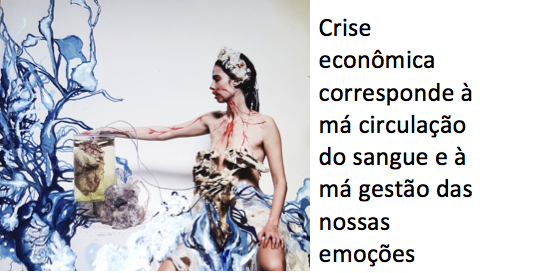
Photo: Rafael Adorjan, performance and painting on photography: Lívia Moura.
Email 3: Infantophobia and Hygiene
Chrystalleni, 8th – 21st May, 5th Lunar cycle of 2020
My Livia,
I let my imagination run with you in the woods. I imagine Jano climbing big trees to catch up with your little ones while we think together, share the chores, organize, and connect with other women around the world, cultivating our understanding and the reach of our ideas. I return to our time at A Casa Lar a year ago, and to our conversations.
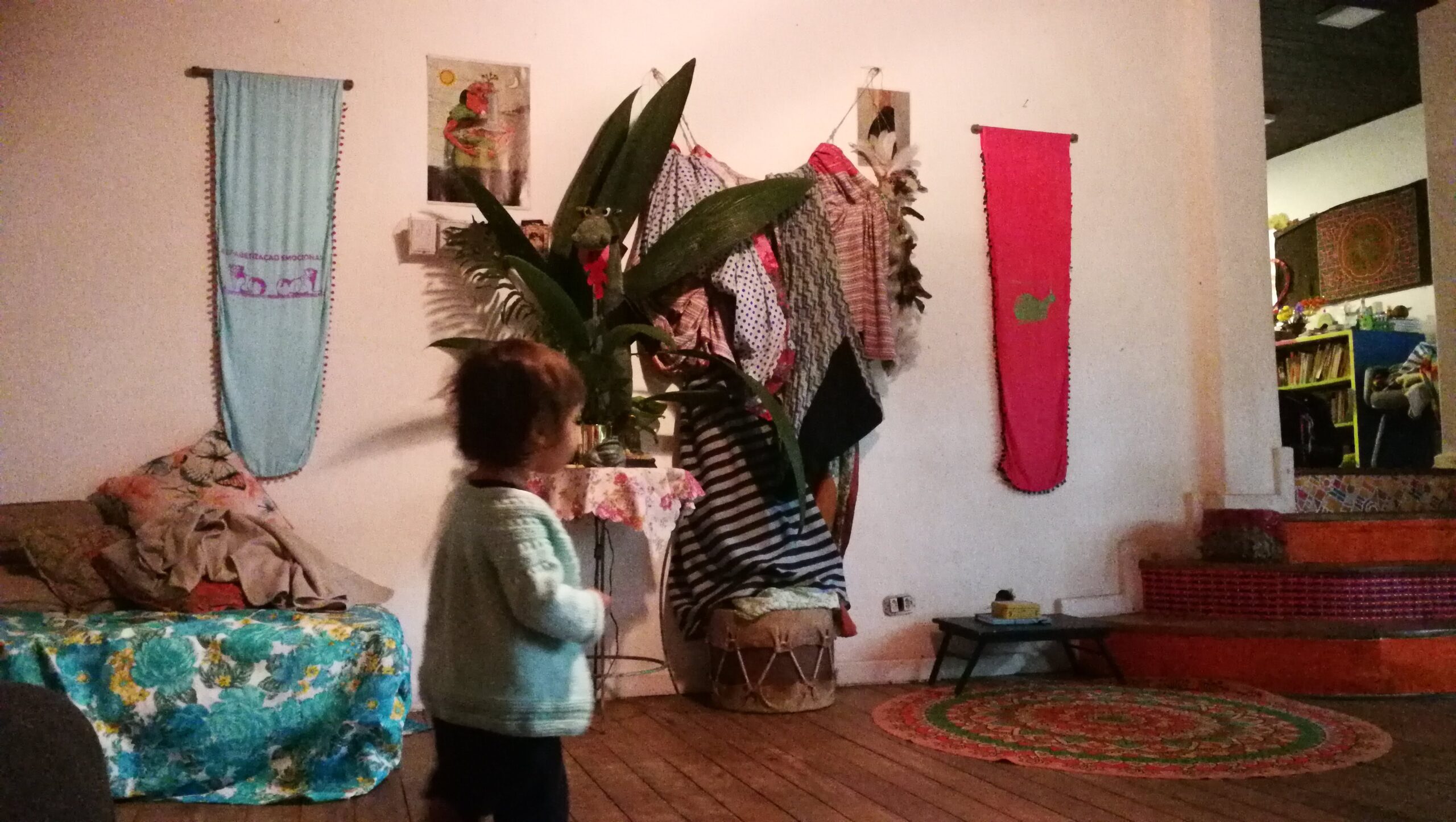
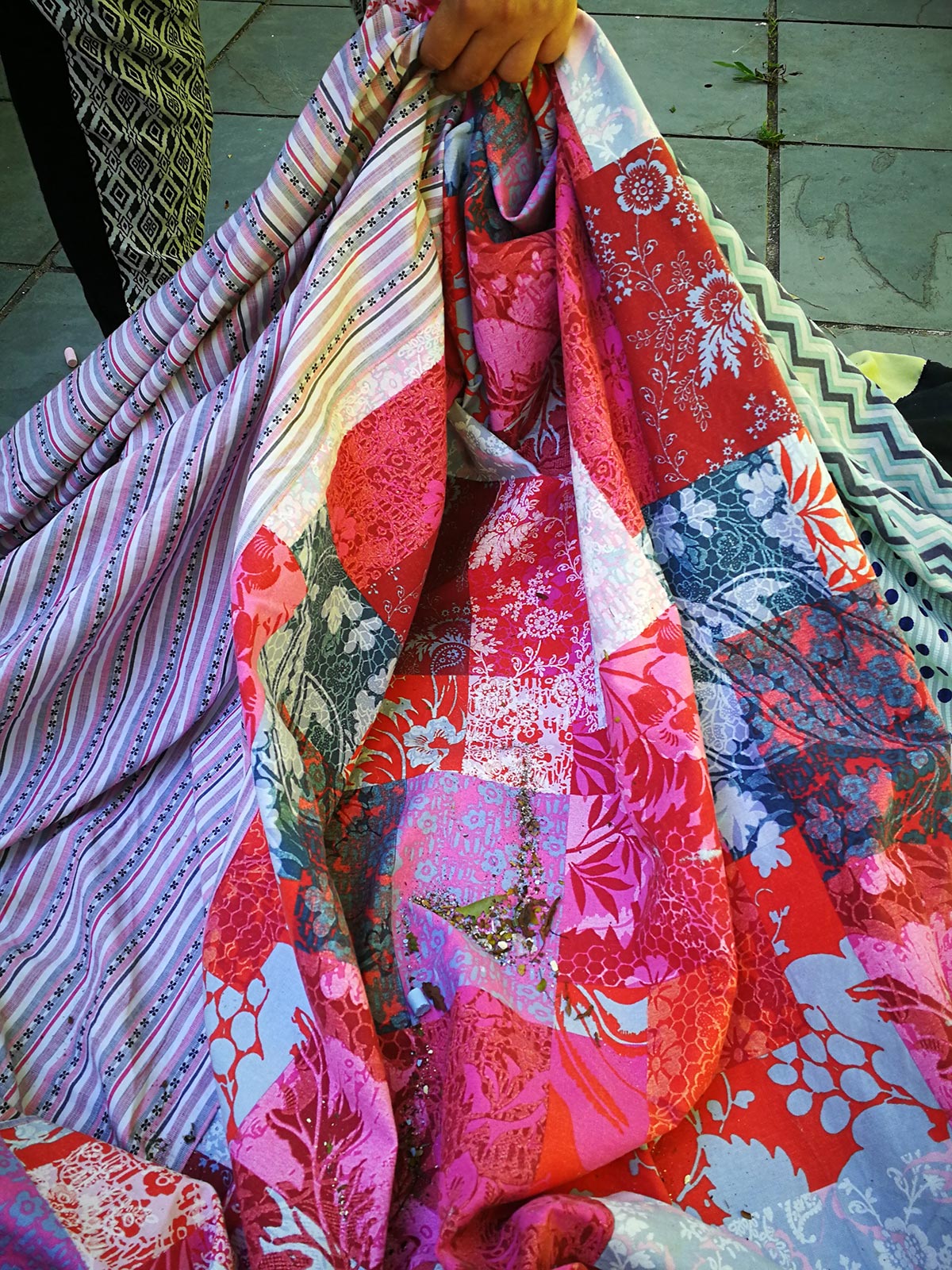
Before I start pouring my heart out, I suggest we keep the description for Saturday’s call short and sweet:
Ixodos: Spreading Affective Immunity. Woman-led Art initiatives unite in resistance. It’s time we connect and share our experiences and intuitions about what to do next. Saturday, May 23rd, 2020, 20:00 Cyprus / 14:00 Rio de Janeiro / 19:00 Marseilles | https://meet.jit.si/ixodos
I’m sorry it took me so long to respond. Your email has been a knot in my stomach. To finish replying I had to let go of my anger towards the things stopping me from doing so. The difficulties l faced in finding the time and the clarity to finish this letter became symbols and difficult realizations around my position as a single mother, and a single mother under Covid-19 isolation. My anger has been directed against everything that makes it hard for me to keep our pact of helping each other live and raise our children by a shared code of connection, freedom in nature, and clarity in their emotions. I have been alone, exhausted, afraid, resentful, and refusing to accept the futures spelled out by the global lockdown/isolation policies and the hidden difficulties and conditions that confine me and my son. It all makes it hard for me to connect with you and make a tangible reality of the miraculous zeitgeist of our sentiments and ideas. It was a struggle to meet you in a place of optimism.
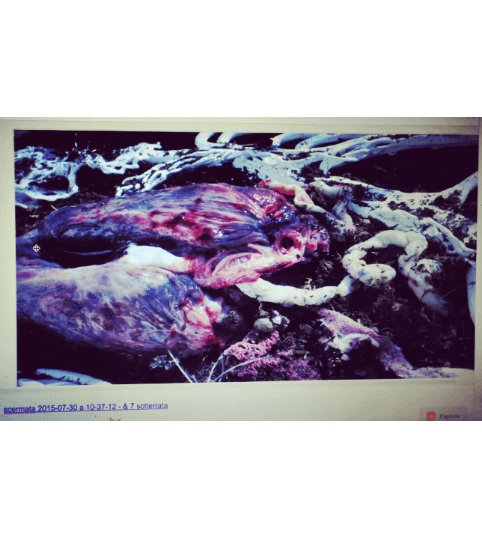
The notion of infantophobia that you brought to me almost a year ago now has been a very powerful lens for me, and a tool. I wonder whether my continued preoccupation with it has drifted away from your intentions. I don’t feel that it has, but it’s such a difficult concept to define. Do you have a definition somewhere? Here’s my quick attempt:
Infantophobia is a fear for children that becomes fear of children. It is the underestimation of children’s wisdom, their kindness, their connection with truth, of their abilities, and the amazing depth of their perception. An underestimation that you can find within institutions and in the rise of oppressive policy in various aspects of life: the discipline of education; lack of faith in their/our bodies and immune system that massively led to a move away from natural childbirth and replaced nursing with a massive powdered milk industry; and the delegation of childhood to an unnatural world of simplified, cutified, compromised, disconnected images and concepts, of plastic toys made for ‘optimal development’ aka closed-ended learning in so-called safe, clean environments and simulacra. It is the fear of childhood, the fear of what children can reveal. Especially if they are allowed to run free as much as they like, or need. Especially if they get to taste the earth and each other early on. The structures make it difficult for us to be present, to be able to connect, and to be attentive to our children’s messages, or to our own intuitions.
Calling out this infantophobia is to realize that we have been breaking our children. We are doing it in the name of safety, and this contains the silencing and pushing down of the child inside ourselves, our denial of instincts (like the fact that women know how to give birth), a denial of our own hidden knowledge, of our own wonder in the world, of our own indigeneity, and a silencing of the fact that this starts with our own connection with nature. Don’t we en masse hide our children from our real lives? Don’t we keep generating spaces and circumstances where children aren’t allowed to be? Don’t we teach them that the responsible thing is to finish their homework and ignore their desire to run, climb, or laugh, get soaked in the rain, that such desires are ridiculous, inappropriate and dangerous? Wouldn’t it appear, according to a phenomenological approach to education, let’s say, that the purpose of our education system is to produce children that are able to ignore their desires and instincts in order to stay put and keep doing paperwork?
Don’t we hide our most significant conversations and decisions from our children? “Don’t take the children out of the room” you told me citing the name of an indigenous leader (I wonder what he thinks about Covid-19). I understood this to mean that the decisions that we take in a way that is hidden from our children are de facto against their interests, decisions that would be dangerous to them (and us), products of things we don’t want to expose them to. So choosing not to take our children out of a room means not to let such decisions be made at all, it means to remain responsible towards them and so to ourselves, and so to each other: not to treat them as lesser creatures, but to show them true respect. To show true respect to life and to nature.
You say that hygiene and isolation in Brazil is necessary and I see this as part of the Brazilian intelligentsia’s resistance to the establishment’s dismissal of the severity of Covid-19. Something that puts a lot of people at risk. Here it’s different: the neo-liberal, plutocratic, hypochondriac, capitalist establishment “took measures” in a way best described as inhumane, impossible, and devastating in response to social media-driven hysteria, with no basis on science and democratic consent. There are no vast forests left here, the land is dry, and we have forgotten how to live by it. What is left of our indigeneity, social cohesion, and nature is not threatened by an illness, but by the totalitarian take-over of all life by narrow-minded medical priorities, and their choice of isolation, sterilization/ overconsumption of masks, gloves and disinfectants, and fear. The state here did two unforgivable things in advance: firstly, they demanded and enforced that people separate into the smallest possible groups rather than unite in humanely and economically reasonable bubbles. They brought them to fear and report their neighbors, decimated and outlawed existing social support networks, and then dysfunctionally institutionalized aid through municipalities and NGOs. They adopted an authoritarian attitude of distrust against the people, spreading devastation, making it near impossible to stay well. Secondly, they enforced measures and used the police in ways that cut people off from nature encouraging that children be kept frighteningly confined. Funnily enough, after some unrest, dog owners were allowed to take their dogs for walks as many times as necessary without having to request permission via text message. Yet no such exception was given to those arguing for the necessity to take kids out more frequently, or to move in order to help others. I like to think everyone found hidden ways for sanity, community, and healthy movement, but the uncritical popularity of #stayhome hashtags, the mass sense of depression, the growing numbers of domestic violence reports tell a different story. Clearly, creative ways of getting around the lockdown are a matter of privilege.
I see the cementing and normalization of policies and the emergence of prejudice and social pressure against those who cannot or will not isolate, sterilize, and who choose a life that isn’t absolutely defined by the fear of this particular virus for themselves or their loved ones. You can see the world dividing itself between those who can isolate and those who cannot.
There appears to me to be two sides that echo our conversations about those who dismiss or live in a world incompatible with children, and those who “keep the children in the room,” and invite others to do the same. Those who decide to lock them up while they take decisions, and those who take their/our nature into account. Children cannot isolate. It’s a nonsensical proposition for them and their instincts (which are geared to their development and strengthening). Indigenous peoples cannot isolate, the poor, the homeless, the underprivileged, the different. Single moms can’t and should not isolate nor our children. We should be together.
It really does seem to me that the world is splitting into these two factions: those who believe they are defending their life from an apocalyptically spreading virus, and those whose life is threatened by the dissolution and the outlawing of the social support networks they relied on.
It’s funny how often I’m told that Jano looks and feels indigenous. I must resist my fear that the world is handling him as a threat and that its policies may inevitably succeed in traumatizing and disconnecting him, forcing a corrupt civilization on him. Should I exercise optimism by trusting him to survive (as well as possible) this radical institutional redefinition of life and of human nature? Is the only way out that I give up any desire to preserve anything for him?6
I am reminded again of the image of you meditating next to the Aphrodite stone, defying the monumentization and museification of life, and the cordoning off of ancient temples and locations from their powerful histories. Defying their surveillance and control so that all we are allowed to perform not just tour and photograph. These edicts of “no dancing without a license,” counter such powerful locations and isolate ancient artifacts from meaningful community.
I also am reminded of the image of you guiding people through the ritual portal last year at Tropical Burn ceremony, and I pray to you, Livia, guardian, mother, Lilith, Iemanja, Aphrodite, Mary. And for all my isolation, I find hope in waiting to hear more about your plan: in the same way I saw you vibrate above those forces trying to constrain the goddess, and in the same way you keep finding ways to connect and mobilize amidst such culture-jamming visual material. How do we rise above this?
Email 4: Megalopolis, Children and Stones.
Livia: August 10th, 8th lunar cycle of 2020
Beloved,
I’m back!
I reread your email many times over the last few months without being able to reply. There is a lot of cutting truth in your writing – a truth that disconcerts. Your words are radical; radical in the sense of root. You make me confront the shadow side, the disquieting hidden face of the moon: Lilith. Stirring up feces that I avoid looking at. I had to let your words decant to get some compost out of them – in the name of Aphrodite’s fertility! lol
In addition, the past few months have been a storm of events. It seems that years of life have passed through me. I went through wonderful and liberating moments, but also painful and extremely difficult. Skin changing processes, abandoning old mental patterns and plunging into many uncertainties.
Spending 4 months confined in an apartment in the city of Rio de Janeiro with 2 super energetic children was one of the most complex lessons I have ever gone through. This only reinforces what, as a single mother, was already an urgent matter: to build a community life that is less infantophobic and more connected with the cycles of nature.
I am writing to you now from the highlands of Mantiqueira, a magical and well-preserved rural region. At this moment, my children are running in the forest inventing endless games: hunting tadpoles, carrying firewood, sharpening branches with sharp knives, making a fire, digging clay holes and contemplating nothing (or rather, everything). There is still no prospect of schools returning here in Brazil and this, however contradictory it may seem, has being extremely liberating for them. What they learn in the countryside is real; it is not the simulacrum of the school that, as incredible as it may be, is now sending apps where students can see the animals from the bottom of the sea. A wonderful app, super scientific, but it makes me sad to think: “these fish are near extinct and so now we have to be happy because we can see them inside our cell phone…”
Also, I am too lazy to return to the pre-pandemic routine of constant insecurity and violence: there are cars that can run over children; there are countless electronic radiations, noises, and hum of machines and cars 24 hours a day; there is the fear of losing a child in the crowd; where moving around the city is immensely time-consuming and difficult; where environments aren’t welcoming for children; there is possibility of an imminent assault; and the dirt and the unhealthiness that is radicalized with a pandemic.
Do you realize that I only have time to write to you when children are free in the woods?
For me, Latin American megalopolises are the supreme sum of infantophobia (and I say this even though I do not live, like many brothers and sisters with shots being fired outside my front door).
If for us adults, the line that divides public and private spaces is demeaning and uncomfortable, imagine for a child?
What if along the long commute to work you needed to stop and rest in a hammock? There are no hammocks under a shadow in the middle of the city. And this becomes more radical if you travel alone with 2 children: in the middle of the journey they may need to poop and their ability to hold on and block their needs (fortunately) is not yet trained like ours.
Megacities are not designed to accommodate children in their full development. The megalopolis is an ecosystem that castrates the vital energy of all beings that inhabit it. It takes a lot of bravery to stay alive and pulsating in it. Without a doubt, striving to maintain our health within it can be seen as an extremely noble, political, spiritual, and ecological mission.
If we think of the disease as the way the body finds itself in order to heal itself, the pandemic can be seen as a call. A sign that can be interpreted as: live in an astronautic asepsis as strange (and foreign) organisms within your own planet or return to integrate and listen to the rhythms of nature. For me Gaia (the planet Earth) thinks, feels, and acts. Our job should be to open up our pores to active listening. And that children know how to do this like no one else, they are perfect sponges (for the best and the worst …).
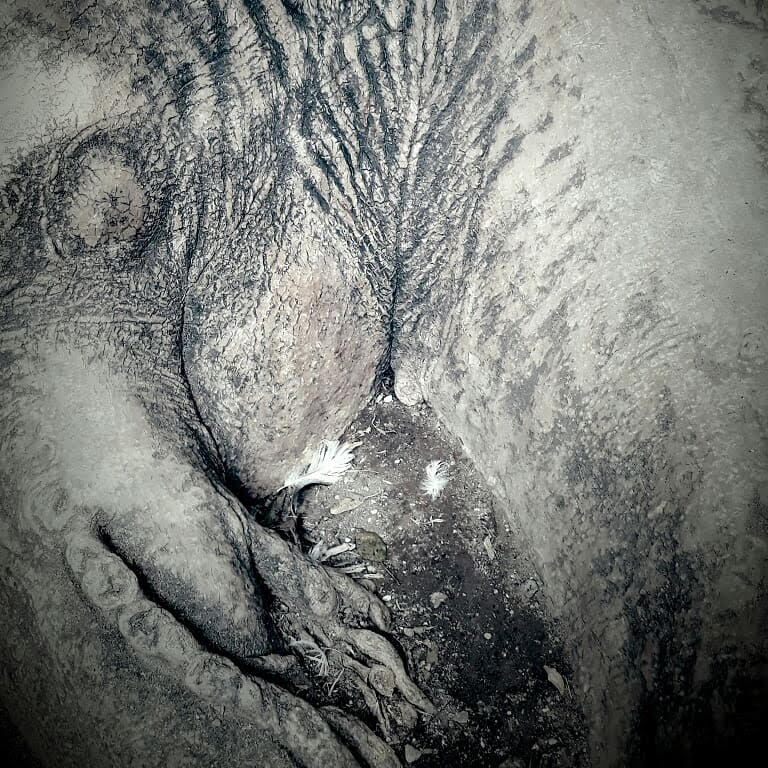
The presence of a child in a work environment is a threat to the obsessive productivism of infinite economic growth. That is why they are not welcome in these environments and need to be isolated from society in schools (this pandemic has further explained the role of the school as a “deposit” for children so that we can get to work).
That’s why Ailton Krenak (the indigenous leader you mentioned) says “don’t take the kids out of the room”. I saw him saying this at the conference “Ciranças na Educação” [Cirandas – circular dances – in Education], Escola Comunitário Cirandas, Paraty, 2018) where my children and some indigenous children were running about and making noise. In the middle of the congress, the indigenous leaders took breaks where everyone stood up and they guided a challenging and fun body game for all ages. This broke from the rhythm of a “normal” congress and just left us much more intellectually awake to absorb indigenous teachings.
What I believe he meant by “don’t take the kids out of the room” is that we need to be resilient, embrace adversity and the natural flow of life. Adults need to play, play is serious. And, at the same time, children need to participate in the activities of adults, learn to manage life with them, and help find creative answers to community conflicts. In the past it was very common for children to learn the crafts of relatives. This does not necessarily have to do with child labor, but rather with the healthy integration of children in the life of the community. “Dominant” societies have transformed this into child exploitation, intending that children produce profits for the boss.
Regarding forced isolation and rigid restrictions, they seem to me to be necessary in a system that is not balanced. And that is the case in large cities. Brazil has a government that is against isolation and we now over 100,000 people have died!! [As of March 2021 this number is close to 300,00]. These numbers include people we know. We are experiencing countless successive tragedies in our country.
As long as we continue to unbalance biomes, new viruses will continue to spread. It is contradictory, but a stricter measure of isolation and hyper hygiene could have prevented so much suffering. Of course, in the medium and long term this will not prevent new pandemic waves.
On the other hand, it is true that isolation has increased cases of domestic violence, feminicide, depression, and even suicide. But all of these symptoms are caused by the same reasons that triggered a worldwide pandemic. And this needs to be faced head on: we are choking off the flow of vital energy.
And isolation also widens the chasm between those who have the privilege of isolating and those who do not: which lives are worth more than others. The pandemic is accelerating and exacerbating the worst about this world. But planetary restoration actions are also strengthening.
Whatever I used to think about what should be done in the future, I am starting to realize that I have to do it now. That’s why it took me almost 3 months to answer your email. I am putting everything I have developed in the last 15 years on a single platform. I am beating my heart with the earth and dreaming of its flow in the construction of the VAV Ethical Stock Exchange (Vendo Ação Virtuosas – Selling Virtuous Actions). We are building the website (www.vendoacoesvirtuosas.art) and a complementary economic platform. I want to set up a new meeting with the Ixodos network to present the project, listen to suggestions, and articulate new actions.
Yes, “they” are cataloging, museifying, burning and boxing our sacred and ancestral objects in order to control our magical vital drive. But “they” don’t understand that the magic drive cannot be confined to an object, because it inhabits our bodies.
When I say “they” I deeply question whether this “they” does not live within “us” as well, if we do not have an internal oppressor, a self-sabotager who oppresses our own vital energy.
“They” are killing our shamans with Covid… it’s a hideous pain!! But I am sure that the healing of the shamans runs through our veins, continues in the roots of the trees and spreads like satellite dishes over the monumental rocks of the beach of Aphrodite (Pathos), Pão de Açúcar (Sugar Loaf mountain in Rio) and Pedra do Picu (sacred stone here from Serra da Mantiqueira that I now see from my window).
Love you!
We are together. I miss you so much…
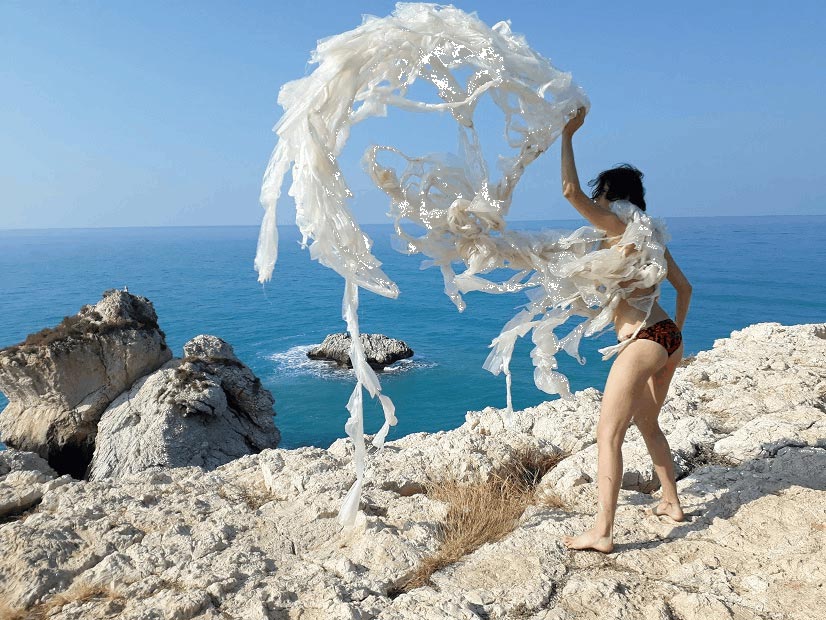
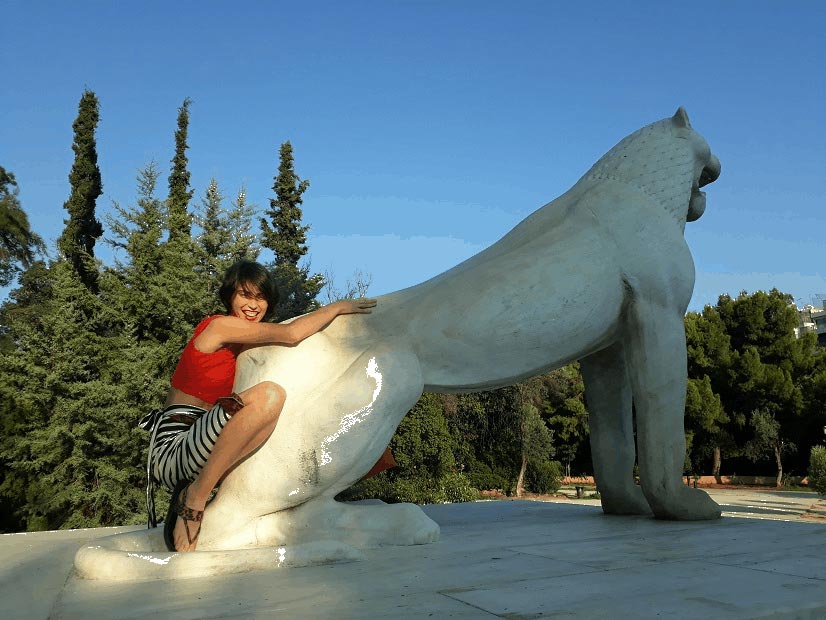
Email 5: The Truth and a Future / Warriors Towards Affective Immunity
Chrystalleni, 15th August 2020, 8th Lunar cycle of 2020
My wildling is asleep and my task is to create a conclusion of sorts for this part of our exchange, and finish tidying up our visual material for MESA. I do this with a joy that is threefold: I take in your blessing for precipitating our transformations through reinvestment in affect and VAV’s “afeto” currency – a currency of affection. I can’t wait to share this conversation with Ixodos and an amazing mailing list I just found where women in the software freedom movement collect powerful women’s’ voices echoing our own concerns and priorities.7 And I can’t stop smiling with dark amusement at the uncanny contrast of the following two snapshots from our Covid prisons in contrast to the cover images at the top of this article: images of our wild adventures in nature across continents, you embodying our equal parts dark and gloriously protective mother-serpent at the rock of Aphrodite, and Janus as he sleeps blissfully by a waterfall in TerraUNA. I see the answer to my question now: now that I know that our truth is in the above (see cover image), I no longer find it so intolerable that we must sometimes return, warriors, guardians, to the below:
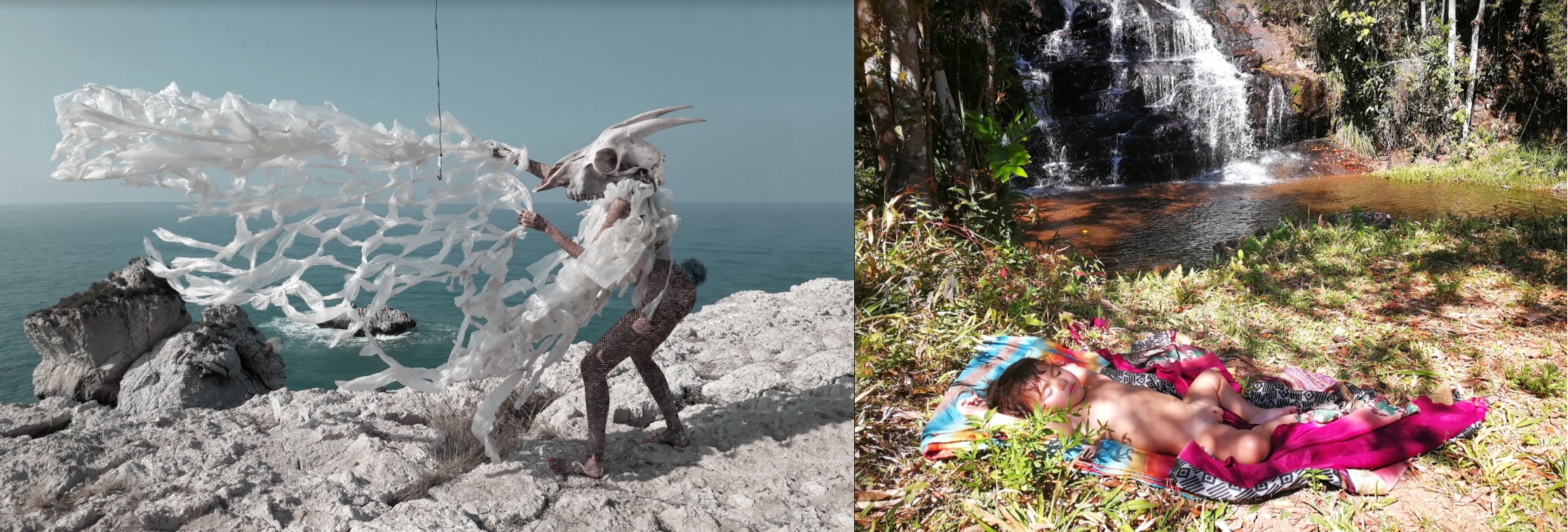
Right: Janus asleep by a water-fall at Terra UNA, Minas Gerais, Brasil, July 2019 one year before this email exchange.
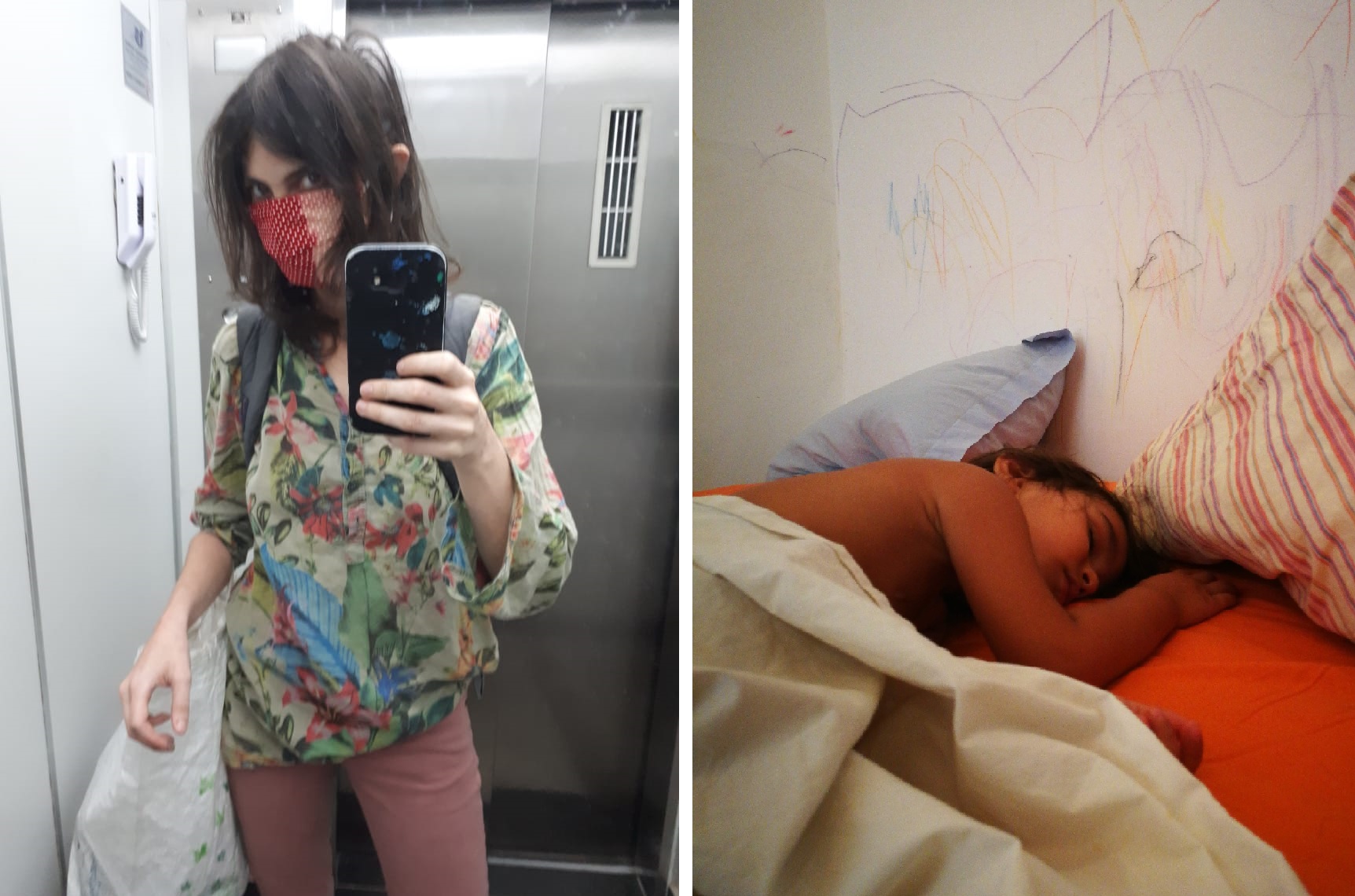
Janus’ wall drawings contain some of the issues you bring up in relation to education: some of them were made in anxiety as he was hoping to be stopped, his lines inevitably reflecting my own anxious disconnection while doing something else, most likely being sucked into a screen trying to either work to provide, or understand what was happening around us. While other drawings were made in delight and with my encouragement-participation to add more color to our surroundings, as we sought activities over which to connect and learn from each other, share meaning and boundaries, and transcend the limitations of our immediate environment. Just like you we have been seeking community in nature reserves, Rainbow Gatherings, and I’ve been looking for connections in the Steiner-Waldorf education movement. There is no illusion any more: the forest is the real school, not the one pushing video and closed source app recommendations on unfree devices and exploitative technologies.
I value this exchange dearly. It’s been an avenue for my most urgent and complicated political concerns: before the interruption we were on the cusp of realizing / articulating something new and impactful through Ixodos, and as soon as this seemed achievable, the stakes rose impossibly, with the urgency that we must now articulate our Call/Manifesto while on quicksand, with our worlds shifting under our feet.
The Ixodos concept is now entirely clear: a network and a set of strategies for gentle exits from dependencies on infantophobic structures. And the next steps are clear: to establish safe havens and rhythms outside the city, to continue consolidating the Ixodos network, VAV’s “afeto” currency and the VAV circulatory system in free software, and to radiate our call to exit gently and connect meaningfully, broadly, and to the best of our now fully activated best instincts and affections.
With love and affective immunity,
Exodus
https://reaphrodite.org/ixodos
Email 6: School Forest
Lívia Moura, 10th January 2021, 1st lunar cycle of 2021
Beloved,
I’ve been rereading our email exchange and I am shocked (positively) to realize how faithful and consistent this record is of the whole process of this past year. For me, 2020 needs to be seen as a reset year, to start over EVERYTHING slowly. It is extremely complex because there are still many castles to crumble, while we are planting the new seeds. We are going to thank and honor what we have in contemporary human society, but to reform everything that is sick without shame. All this chaos is the cue that Earth has given us to change the course of humanity. After almost a whole year of uncertainties, self-questions, and concerns I decided to come and live in Itamonte with my children in a rural neighborhood, where I will have space for a studio and several cows around – lol. My kids are great, happier than ever. It was a year of intense learning and a lot of wisdom transmitted by nature. The forest educates; it is a school. It is as if I have been embodying what Guilherme Vergara8 has been saying in recent years with the idea of a “school of art becoming a forest”. In addition, the Afeto currency software that will circulate within the Ethical Stock Exchange is now ready: www.bancodoafeto.art. We will start promoting multilateral and multispecific exchanges. We call currency users “virtuous shareholders”, as this bank with its list of ads is a way to connect and inspire people who are thinking and acting for planetary regeneration and the restoration of our future. Shall we think about how to take and expand our Ixodos exchanges within this complementary economic platform?
I want to share with you a summary of the latest reflections on this economic system that we are creating:
The economy of affection is already the economy that sustains planetary life. Without it, no baby would survive. All we seek in life is to love and be loved. Even in the most heinous of crimes and the excessive accumulation of capital, deep down there is a creation of a strategy (tragic and inappropriate) to obtain love. Economy is a heart that beats money and should be distributed with unconditional love. I believe that all emotions come from love or lack of it. Therefore, economic crisis would correspond to poor blood circulation and poor management of our emotions. It is intriguing that Covid slows down our blood circulation together at a time when the economy is accelerating the pace of our lives. We need to learn to listen and follow the heartbeat of the Earth, managing our emotions, our vital energy, so that it is not blocked, coagulated or monopolized in the hands of a small portion of the population.
If you register with Banco do Afeto, I would very much like you to offer a class on “Subversive technology: how to use technology wisely and politically, without drowning in strategies to control our minds and emotions”.
I want to thank you for inviting me to teach a class in your arts discipline at the University of Nicosia and I want to offer you the same invitation. This semester I will give a discipline in the undergraduate arts program at Universidade Federal Fluminense, a teaching internship that is part of the doctorate I have just began with Guilherme Vergara in Contemporary Studies of the Arts. Maybe we can connect our students through Banco do Afeto?
I wait for you!
And let’s keep in touch! This political-affective network is essential to maintain sanity at this time. That’s what will hold us together until the storm passes. In fact, it will be the solidarity networks that will make the storm go away.
You, Jessica Gogan, Guilherme Vergara, Evanthia Tselika, and Carol Cortes are part of my universal family.
I wish you a lot of courage, enthusiasm, lightness, joy, and childlike spirit to face everything that needs to be reformed in this crazy world that we live in.
And love, of course, without it nothing makes sense.
Bjs,
Livia
***
Lívia Moura
Works in diverse artistic languages and has participated in numerous exhibitions and contemporary art fairs in Brazil. She is the author of the didactic material Raiz do Afeto, aimed at socioemotional competences for primary education (2019, ed. Raiz Educação). In 2013 she co-created VAV (Vendo Ações Virtuosas – Seeling Virtuous Actions), a contemporary art platform that bridges and works across economy, pedagogy, and social engagement. In 2020-2021 VAV developed and launched the social coin “Afeto” [Affect/Affection] and the “Stock Exchange of Ethical Values”. She is currently studying for her doctorate at the Postgraduate Program in Contemporary Studies of the Arts at Universidade Federal Fluminense with professor Luiz Guilherme Vergara.
Chrystalleni Loizidou
Loizidou’s past work sought meaning in academic research regarding conflict transformation in relation to art and media history and efforts for recovering the commons (PhD Cultural Studies with the London Consortium). She worked with a number of universities, art-centers, and internationally funded programs with increasing focus on free and open source technology, until a child reactivated her connection with a circle of heart-giving art educators in Brazil and helped her see what the Situationists’ meant with their rejection of alienated labor. Together they have begun to map the bravest and most meaningful art-educational initiatives around the world and focus on holding space and community for free play, towards what Silvia Federici describes as a re-enchantment. neeii.info
1 Ixodos is the name of an international artistic exchange project created by Chrystalleni Loizidou and Evanthia Tselika from the Cyprus collective RE-Aphrodite and Lívia Moura and Carol Cortes from the Brazilian collective Vendo Ação Virtuosas. Ixodo is a mixture of the Greek words ‘Exodo’ (exit) and Isodo (entrance), in addition to being a type of arachnid
2 Mary Douglas, Purity and Danger: An Analysis of Concepts of Pollution and Taboo (London: Routledge, 1966)
3 In 2018 Carol Cortes and Livia Moura traveled to Greece and subsequently Cyprus for an artistic residency with the collective RE-Afrodite (organized by Chrystalleni and Evi Tselika) where the Ixodos collective project and international art exchange was born.
4 One of the most famous sacred prostitutes was Aspasia who lived in the period of 470a.c. to 400 BC in Athens and had great influence on the politics of the time.
5 Interview done during the 2020 quarantine with Mariana Pimentel about what is a domestic theoretician with Caio Souto – Philosophical conversations (Apr 24, 2020) What is a domestic theoretician? Interview with Mariana Pimentel https://www.youtube.com/watch?v=neRbtDie3T0
6 I include here an early version of this email: “I found myself and my little one alone for weeks, increasingly desperate and deprived of healthy sociability and contact, avoided by my panic-inclined mother, our small support system scattered far away. I found difficulty performing basic daily tasks like shopping and making food, among new neighbors who I hardly knew, unable to catch up with the news and in shock by their political implications and impacts. I was looking around for community (where had all my work gone? All my research on community? My art?) I was in an unfinished house that didn’t feel like a home, that I had until recently looked at as a community-run democratic school, struggling to repair badly installed plumbing (good plumbing, it appears, largely depends on men), and trying to respond civilly to phone calls from concerned relatives admonishing me to see no-one and wear a mask, while trying to own and transcend my situation, and stop thinking of myself and my child as victims of various piled up chauvinisms. But how am I supposed to do this, and why should I keep a child and the child within me so tragically and nonsensically confined? How did I, for all my premonitions and collective dreams and rituals find myself so supremely alone? Here in this insular, clinical, sterile island of subjected womanhood and oppressed childhood, that has been selling out its sacred Aphrodite legacy in the form of sexual exploitation and oil, so much at the mercy of the pharmaceutical industry and conventional medical system that we have the highest rate of births by cesarean section in the world, where indigeneity has long been beaten out of the population, the proud home of the headquarters of WarGaming and PornHub, in this place so segregated and controlled by war and dirty money, and so overly complicit with the logics of capitalism, where identification with the idiotic (literal translation: privatizing, private-interest-seeking) colonizer is nearly complete. I will send this email now, messy, repetitive, less effective than I need it to be. I have all the excuses in the world for stealing time in order to write it on my phone, and falling asleep on too many unfinished thoughts, and then despairing of tying to put them together.

